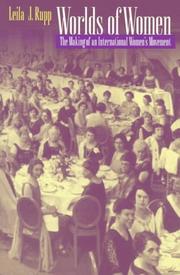| Listing 1 - 10 of 29 | << page >> |
Sort by
|

ISBN: 0226731553 9780226731568 9780226731551 0226731561 Year: 1999 Publisher: Chicago : University of Chicago Press,
Abstract | Keywords | Export | Availability | Bookmark
 Loading...
Loading...Choose an application
- Reference Manager
- EndNote
- RefWorks (Direct export to RefWorks)
Gays --- Homosexuality --- Homosexuels --- Homosexualité --- History. --- Histoire --- Homosexualité --- United States --- History --- Gays - United States - History. --- Homosexuality - United States - History. --- Gay people
Book
ISBN: 0691046492 0691600139 1400870976 9780691046495 0691630100 Year: 1978 Publisher: Princeton, N.J. : Princeton University Press,
Abstract | Keywords | Export | Availability | Bookmark
 Loading...
Loading...Choose an application
- Reference Manager
- EndNote
- RefWorks (Direct export to RefWorks)
To discover how war can affect the status of women in industrial countries, Leila Rupp examines mobilization propaganda directed at women in Nazi Germany and the United States. Her book explores the relationship between ideology and policy, challenging the idea that wars improve the status of women by bringing them into new areas of activity. Using fresh sources for both Germany and the United States, Professor Rupp considers the images of women before and during the war, the role of propaganda in securing their support, and the ideal of feminine behavior in each country. Her analysis shows that propaganda was more intensive in the United States than in Germany, and that it figured in the success of American mobilization and the failure of the German campaign to enlist women's participation. The most important function of propaganda, however, consisted in adapting popular conceptions to economic need. The author finds that public images of women can adjust to wartime priorities without threatening traditional assumptions about social roles. The mode of adaptation, she suggests, helps to explain the lack of change in women's status in postwar society. Far-reaching in its implications for feminist studies, this book offers a new and fruitful approach to the social, economic, and political history of Germany and the United States.Originally published in 1978.The Princeton Legacy Library uses the latest print-on-demand technology to again make available previously out-of-print books from the distinguished backlist of Princeton University Press. These editions preserve the original texts of these important books while presenting them in durable paperback and hardcover editions. The goal of the Princeton Legacy Library is to vastly increase access to the rich scholarly heritage found in the thousands of books published by Princeton University Press since its founding in 1905.
Propaganda, American --- World War, 1939-1945 --- Women --- Propaganda, German. --- Propaganda, American. --- Propaganda. --- Social conditions --- Propaganda, German --- Propaganda --- Social conditions. --- German propaganda --- Pangermanism --- American propaganda --- World War, 1939-1945 - Women - United States --- World War, 1939-1945 - Propaganda --- Women - United States - Social conditions --- Women - Germany - Social conditions --- World War, 1939-1945 - Women - Germany

ISBN: 0691016755 9780691016757 9780691016764 0691016763 0691221812 Year: 1997 Publisher: Princeton Princeton University Press
Abstract | Keywords | Export | Availability | Bookmark
 Loading...
Loading...Choose an application
- Reference Manager
- EndNote
- RefWorks (Direct export to RefWorks)
Worlds of Women is a groundbreaking exploration of the "first wave" of the international women's movement, from its late nineteenth-century origins through the Second World War. Making extensive use of archives in the United States, England, the Netherlands, Germany, and France, Leila Rupp examines the histories and accomplishments of three major transnational women's organizations to tell the story of women's struggle to construct a feminist international collective identity. She addresses questions central to the study of women's history--how can women across the world forge bonds, sometimes even through conflict, despite their differences?--and questions central to world history--is internationalism viable and how can its history be written? Rupp focuses on three major organizations that were technically open to all women: the broadly based and cautious International Council of Women, founded in 1888; the feminist International Alliance of Women, originally called the International Woman Suffrage Alliance, founded in 1904; and the vanguard Women's International League for Peace and Freedom, which grew out of the International Congress of Women that met at The Hague in 1915. The histories of these organizations, and their stories of cooperation and competition, shed new light on the international women's movement. They also help us to understand the different but connected story of the second wave of international feminism that emerged from the ashes of World War II.
International Alliance of Women --- International Council of Women --- Women's International League for Peace and Freedom [Geneva] --- History --- International relations. Foreign policy --- Community organization --- Sociology of the family. Sociology of sexuality --- Feminism --- Women's rights --- Women --- Human females --- Wimmin --- Woman --- Womon --- Womyn --- Females --- Human beings --- Femininity --- Rights of women --- Human rights --- Emancipation of women --- Feminist movement --- Women's lib --- Women's liberation --- Women's liberation movement --- Women's movement --- Social movements --- Anti-feminism --- International cooperation&delete& --- Political activity&delete& --- Societies and clubs&delete& --- Civil rights --- Law and legislation --- Legal status, laws, etc. --- Emancipation --- Women in politics --- International cooperation --- Societies and clubs --- Féminisme --- Femmes --- History. --- Political activity --- Coopération internationale --- Histoire --- Activité politique --- Associations --- Droits --- International cooperation. --- Societies and clubs. --- Political activity. --- Abbott, Elizabeth. --- African American women. --- Berne Convention. --- Bompas, Katherine. --- Catholic women. --- Correspondence Internationale. --- Egyptian women. --- Equal Nationality Treaty. --- Equal Rights Treaty. --- Ford Peace Ship. --- Gobat, Marguerite. --- Gripenberg, Alexandra. --- Hertzka, Yella. --- Hurwitz, Edith. --- International Conference of Socialist Women. --- Jewish women. --- Khan, Aga. --- Kollontai, Alexandra. --- Liaison Committee. --- Lutz, Bertha. --- Maison Internationale. --- Nabarawi, Saiza. --- Palestine. --- Paul, Alice. --- Polish women. --- Schreiber-Krieger, Adele. --- Six Point Group. --- Tunis. --- Vérone, Maria. --- Whittier, Nancy. --- Wollstonecraft, Mary. --- Yugoslavia. --- Zetkin, Clara. --- Zionism. --- anti-Semitism. --- communism. --- disarmament. --- feminist orientalism. --- humanism. --- imperialism. --- internationalism. --- leadership. --- membership symbols. --- minutes of meetings. --- moral issues. --- nationalism. --- racism. --- recruitment. --- suffrage. --- symbolic expressions. --- unanimity rule, debate over. --- world citizenship. --- Women's clubs --- Women's organizations --- Clubs --- Societies --- Feminism - International cooperation - History --- Women's rights - International cooperation - History --- Women in politics - History --- Women - Societies and clubs - History --- International --- International politics --- Women's movements --- Book --- First feminist wave
Book
ISBN: 0814775926 0814777260 9780814775929 9780814777268 0814777457 Year: 2011 Publisher: New York : New York University Press ;
Abstract | Keywords | Export | Availability | Bookmark
 Loading...
Loading...Choose an application
- Reference Manager
- EndNote
- RefWorks (Direct export to RefWorks)
"A lyrical and meticulously researched mapping of the ways in which diverse societies have shaped female same-sex sexuality across time and geograhy From the ancient poet Sappho to tombois in contemporary Indonesia, women throughout history and around the globe have desired, loved, and had sex with other women. In beautiful prose, Sapphistries tells their stories, capturing the multitude of ways that diverse societies have shaped female same-sex sexuality across time and place. Leila J. Rupp reveals how, from the time of the very earliest societies, the possibility of love between women has been known, even when it is feared, ignored, or denied. We hear women in the sex-segregated spaces of convents and harems whispering words of love. We see women beginning to find each other on the streets of London and Amsterdam, in the aristocratic circles of Paris, in the factories of Shanghai. We find women's desire and love for women meeting the light of day as Japanese schoolgirls fall in love, and lesbian bars and clubs spread from 1920s Berlin to 1950s Buffalo. And we encounter a world of difference in the twenty-first century, as transnational concepts and lesbian identities meet local understandings of how two women might love each other. Giving voice to words from the mouths and pens of women, and from men's prohibitions, reports, literature, art, imaginings, pornography, and court cases, Rupp also creatively employs fiction to imagine possibilities when there is no historical evidence. Sapphistries combines lyrical narrative with meticulous historical research, providing an eminently readable and uniquely sweeping story of desire, love, and sex between women around the globe from the beginning of time to the present." --
Lezbištvo --- lezbijke --- homoseksualost --- spolna usmerjenost --- diskriminacija --- družbena neenakost --- družbena zgodovina. --- Lesbianism --- Lesbians --- History.
Book
Year: 2009 Publisher: New York New York University Press
Abstract | Keywords | Export | Availability | Bookmark
 Loading...
Loading...Choose an application
- Reference Manager
- EndNote
- RefWorks (Direct export to RefWorks)
Sociology of the family. Sociology of sexuality --- Sexology --- History --- Homosexuality --- Female homosexuality --- Book
Book
Year: 1998 Publisher: Princeton : Princeton University Press,
Abstract | Keywords | Export | Availability | Bookmark
 Loading...
Loading...Choose an application
- Reference Manager
- EndNote
- RefWorks (Direct export to RefWorks)
Book
Year: 1978 Publisher: Princeton University Press
Abstract | Keywords | Export | Availability | Bookmark
 Loading...
Loading...Choose an application
- Reference Manager
- EndNote
- RefWorks (Direct export to RefWorks)
Book
Year: 1998 Publisher: Princeton, NJ ; Chichester, UK Princeton University Press
Abstract | Keywords | Export | Availability | Bookmark
 Loading...
Loading...Choose an application
- Reference Manager
- EndNote
- RefWorks (Direct export to RefWorks)
Book
ISBN: 9780691221816 Year: 2022 Publisher: Princeton, NJ
Abstract | Keywords | Export | Availability | Bookmark
 Loading...
Loading...Choose an application
- Reference Manager
- EndNote
- RefWorks (Direct export to RefWorks)
Book
ISBN: 9780814777459 Year: 2009 Publisher: New York, NY
Abstract | Keywords | Export | Availability | Bookmark
 Loading...
Loading...Choose an application
- Reference Manager
- EndNote
- RefWorks (Direct export to RefWorks)
| Listing 1 - 10 of 29 | << page >> |
Sort by
|

 Search
Search Feedback
Feedback About UniCat
About UniCat  Help
Help News
News